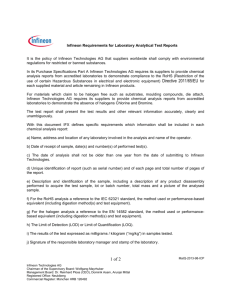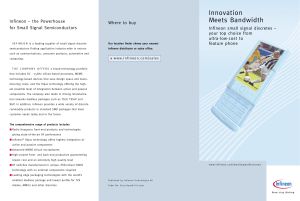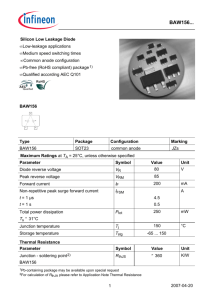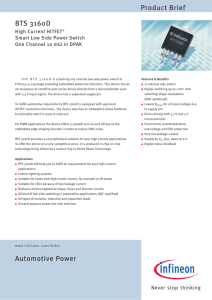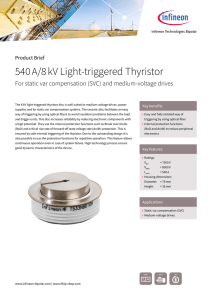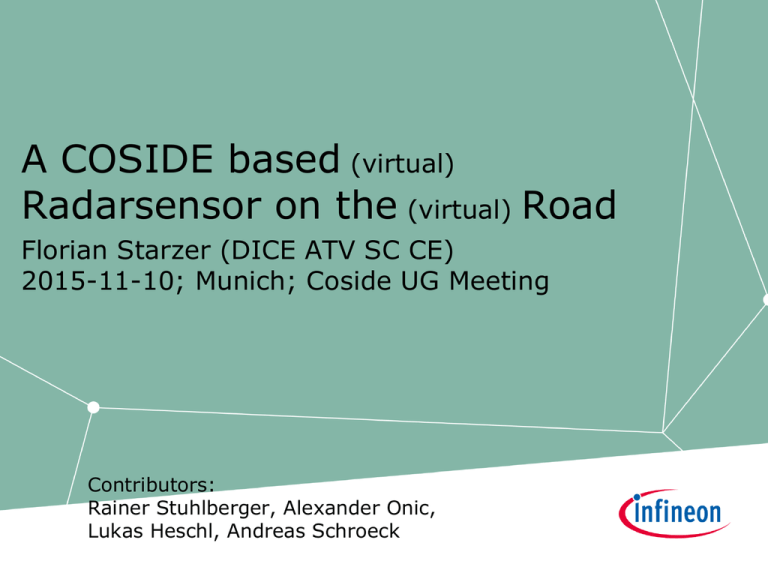
A COSIDE based (virtual)
Radarsensor on the (virtual) Road
Florian Starzer (DICE ATV SC CE)
2015-11-10; Munich; Coside UG Meeting
Contributors:
Rainer Stuhlberger, Alexander Onic,
Lukas Heschl, Andreas Schroeck
Purpose and Vision – Product 2 System
› Infineon’s Radar Success Story:
› First IFX 77GHz Radar Sensor
– 2003:
77GHz SiGe:C VCO
– 2005:
77GHz Transmitter
77GHz Receiver
– 2006:
77GHz 2RX 2TRX
+ VCO Prototype
– 2009:
series Product
Porsche
Panamera
– 2012:
SiGe:C + CMOS
Companion
– 2014:
BiCMOS Integration
2015-11-10
Copyright © Infineon Technologies AG 2015. All rights reserved.
2
3rd Gen, Carrying the WORLD
› 3rd Gen. has done a great job!
› Support of 3rd Gen. RADAR
› Derivate solutions have supported
4th Gen. RADAR
› CMOS companion has enhanced
functionality and flexibility to
3rd Gen. derivate solutions
› We think, it’s time for 3rd Gen
and its companion to retire
› The next generation shall
contain all the knowledge in
one design
2015-11-10
Copyright © Infineon Technologies AG 2015. All rights reserved.
3
Historic Attempts?
› Customer demands product with very brief description
– Brief and hard to fulfill specification
› Block concept with simple
ideal simulation (Matlab ®, Simulink)
– Demands to circuit design
– Layout back annotation
› Test circuit functional verification
– Refinements
› Product
– Lessons learned: some spec. values over demanded!
› Future: Pre-Sim and relax demands!
2015-11-10
Copyright © Infineon Technologies AG 2015. All rights reserved.
4
Generation 4 System Approach
› Infineon RADAR Products:
› Waveform Generator
› RF-Transmitter
› RF-Receiver
› No influence on
– AFE+ADC+DFE
– Microcontroller
– Power supply
› Gen. 5 to be supported
– Com. Interface
2015-11-10
Copyright © Infineon Technologies AG 2015. All rights reserved.
5
What is the Virtual Prototype?
›
The Virtual Prototype is a computer simulation model (software) that is a complete bitand cycle-accurate, functional model of the RADAR chip and includes a simple channel
model (target scenario).
Target 1
Configuration by user
(configuration file)
…
RF-Front
End
Target 2
Virtual Prototype
…
Target 4
(Bumper)
Target 3
SPI
LVDS
User input:
Signals as file
User output:
Signals as file
›
Same interface as silicon chip on PIN level
›
Same programming as final hardware (via SPI)
2015-11-10
Copyright © Infineon Technologies AG 2015. All rights reserved.
6
VP – Design Insights (1/3)
› How is the virtual prototype designed?
G
› blocks are known (Core Concept defined)
– basic functionality is known too
GAIN
– models are implemented from simple to sophisticated
– level 1:
~
basic function – examples
LO
IF
RF
LO
G
GAIN
2015-11-10
Copyright © Infineon Technologies AG 2015. All rights reserved.
7
VP – Design Insights (2/3)
› saturation modelled using polynomal
fitting methods.
G
– model calculated @ VP init
GAIN
CLIPPING
– model 2 be interchanged with design update
– level 2: non-linearities are
partly taken into account
~
LO
IF
RF
LO
G
GAIN
2015-11-10
Copyright © Infineon Technologies AG 2015. All rights reserved.
8
VP – Design Insights (3/3)
› implementation levels 3 & 4
– level 3: higher order
non-linearities are modelled
as add-on to the clipping behavior
+
G
GAIN
CLIPPING
NOISE
– level 4: noise is taken into account (defined via Noise Figure)
› Computational Effort: e.g. amplifier
– level 1:
1 mult.
– level 2:
1 mult. + if then else statement
– level 3:
3 mult. + 2 adds + if then else statement
– can be even more complicated, depends on composition of model
– level 4:
2015-11-10
4 mult. + 3 adds + if then else statement
Copyright © Infineon Technologies AG 2015. All rights reserved.
9
VP – Design Insights - Conclusion
› Several implementations possible:
+
G
– level 1: simple amplification
variable on simulation start
GAIN
CLIPPING
NOISE
– level 2: …add clipping shift-able
… simulation data to be used on
start & interchangeable with csv files from designers
– polynomial fitting algorithms
used to fetch P1dB behavior
from design files or
measurement results
– level 4: serval random
gen. solutions are available
to vary possible close to
reality behavior
theoretical
response
1dB
output power (dBm)
– level 3:
actual
response
compression
region
linear
region
P1dB
input power (dBm)
2015-11-10
Copyright © Infineon Technologies AG 2015. All rights reserved.
10
Simulation Insights
› improving speed @ same quality of data?
› relax carrier frequency demands
frequency
81GHz
6GHz
76GHz
1GHz
rx
tx
IF
RF
›
LO
CONDITION: same
ramp steepness & bandwidth!
time
– shift virtual LO to lower value run simulation
– same number of samples for “lower” frequency @ more time
between two steps
– digital core computation is calced at virtual real time
– backscale result to value as if has been simulated at actual LO
2015-11-10
Copyright © Infineon Technologies AG 2015. All rights reserved.
11
Problem Formulation
› Our digital design consists of three stages:
– Concept
– Virtual Prototype (Coside / SystemC)
– Realization (design) in
VHDL or others
› We need to make sure, each
of them works, according to
– the draft
– customer requirements
2015-11-10
Copyright © Infineon Technologies AG 2015. All rights reserved.
12
Verification with Virtual Prototype (I)
›
Module under test is connected to the test bench
module, which handles input to and output from
the module with data files
›
Available test bench modules:
–
test_bench_dig
–
testbench_dig_fp
–
testbench_dig_hiprec
test bench connected to the SRC module
test bench for fixed point modules
file out with high decimal precision
schematic of test_bench_dig
2015-11-10
Copyright © Infineon Technologies AG 2015. All rights reserved.
13
Design Verification
› Power Up sequence applied to both, CV and circuit simulation
– Comparison of signals highlights divergence from concept
– Timing issues can be tracked easily
– Virtual world scenarios mirror behavior of real world scenarios
and help to find measurement and test cases
– Digital domain regression be formulated
– CRC verification
– CRC test-cases be defined for measurement
– ROM code of FW to be applied to VP
– Test routines be evaluated before first silicon arrives
2015-11-10
Copyright © Infineon Technologies AG 2015. All rights reserved.
14
Concept and Design Verification
› Matlab ® based verification framework
Matlab ® / Octave
signal
generation
concept
verification
analytic/by simulation
SystemC
simulation
VHDL
simulation
Cadence
…
NCSim
signal
analysis
2015-11-10
Copyright © Infineon Technologies AG 2015. All rights reserved.
15
Firmware functions developed on VP
› VP used to verify FW functionality
› Virtual IRP already verified
› Test cases used to cross-verify circuit wiring and consistency of
concept with design
› Firmware development starts with completion of basic VP version
and is preceded and refined with each enhancement of the VP
› Less updates gains time & money
Verification Environment
Virtual Prototype
AMS Simulation
ACORE
Ruby
testcase
TCP/IP
Virtual IRP
SPI
DCORE
RFCORE
Firmware
ROM File
2015-11-10
Copyright © Infineon Technologies AG 2015. All rights reserved.
16

